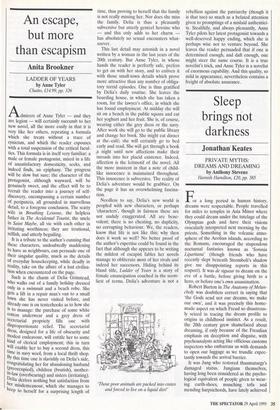An escape, but more than escapism
Anita Brookner
LADDER OF YEARS by Anne Tyler Chatto, £14.99, pp. 326 Admirers of Anne Tyler — and they are legion — will certainly succumb to her new novel, all the more easily in that it is very like her others, repeating a formula which she treats without a trace of cynicism, and which the reader espouses with a total suspension of the critical facul- ties. This formula is in itself very familiar: a male or female protagonist, mired in a life of unsatisfactory domesticity, seeks, and indeed finds, an epiphany. The progress will be slow but sure; the character of the protagonist, although wayward, will be genuinely sweet, and the effect will be to recruit the reader into a journey of self- discovery, encompassing a certain number of peripateia, all grounded in marvellous detail, to a foregone conclusion. The scatty wife in Breathing Lessons, the helpless father in The Accidental Tourist, the uncle in Saint Maybe, all vie with each other in irritating worthiness; they are irrational, selfish, and utterly beguiling.
It is a tribute to the author's cunning that these characters, undoubtedly maddening to have as neighbours, can persuade one of their singular quality, much as the details of everyday housekeeping, while deadly in reality, take on the allure of a lost civilisa- tion when encountered on the page.
Such is the charm of Delia Grinstead, who walks out of a family holiday dressed only in a swimsuit and a beach robe. She gets a lift in a repair man's van to a small town she has never visited before, and already one is on tenterhooks as to how she is to manage: the purchase of some white cotton underwear and a grey dress of secretarial propriety fills one with disproportionate relief. The secretarial dress, designed for a life of obscurity and Modest endeavour, will entitle her to some kind of clerical employment; this in turn Will enable her to buy a second dress, this time in navy wool, from a local thrift shop. By this time one is slavishly on Delia's side, congratulating her for abandoning husband (preoccupied), children (brutish), mother- in-law (overbearing) and sisters (irritating). Delia derives nothing but satisfaction from her misdemeanour, which she manages to keep to herself for a surprising length of time, thus proving to herself that the family is not really missing her. Nor does she miss the family. Delia is thus a pleasantly subversive but utterly genteel heroine who — and this only adds to her charm has absolutely no sexual encounters what- soever.
This last detail may astonish in a novel written by a woman in the last years of the 20th century. But Anne Tyler, in whose hands the reader is perfectly safe, prefers to get on with her story, and to enliven it with those small-town details which prove more attractive than any number of obliga- tory torrid episodes. One is thus gratified by Delia's daily routine. She leaves the boarding house, in which she has taken a room, for the lawyer's office, in which she has found employment. At midday she will sit on a bench in the public square and eat her yoghurt and her fruit. She is, of course, wearing either the grey dress or the navy. After work she will go to the public library and change her book. She might eat dinner at the cafe; she will certainly go to bed early and read. She will get through a book ,a night until new affections make their inroads into her placid existence. Indeed, affection is the leitmotif of the novel. All the more insistent in that a note of child- like innocence is maintained throughout. This innocence is subversive. The reality of Delia's adventure would be grubbier. On the page it has an overwhelming fascina- tion.
Needless to say, Delia's new world is peopled with new characters, or perhaps `characters', though in fairness these are not unduly exaggerated. All are bene- volent; there is no cheating, no duplicity, no corrupting behaviour. We, the readers, know that life is not like this; why then does it work so well? No better proof of the author's expertise could be found in the fact that although she appears to be writing the mildest of escapist fables her novels manage to obliterate most of her rivals and indeed her successors. Hiding behind its bland title, Ladder of Years is a story of female emancipation couched in the seem- liest of terms. Delia's adventure is not a `Those poor animals are packed into crates and forced to live on a liquid diet!' rebellion against the patriarchy (though it is that too) so much as a belated attention given to promptings of a mislaid authentici- ty. Stealthily, and always pleasantly, Anne Tyler pilots her latest protagonist towards a well-deserved happy ending, which she is perhaps wise not to venture beyond. She leaves the reader persuaded that if one is determined enough, and daft enough, one might steer the same course. It is a true novelist's trick, and Anne Tyler is a novelist of enormous capability. And this quality, so mild in appearance, nevertheless contains a freight of absolute assurance.


























































 Previous page
Previous page